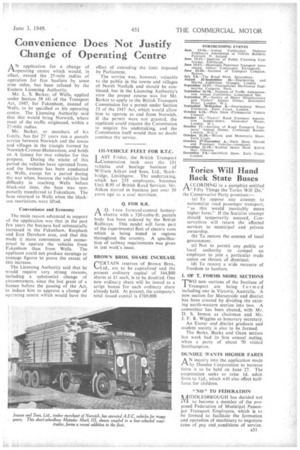Convenience Does Not Justify Change of Operating Centre
Page 5

If you've noticed an error in this article please click here to report it so we can fix it.
AN application for a change of operating centre which would, in
• effect, extend the 25-mile radius of operation for free hauliers by some 'nine miles, has been refused by the Eastern Licensing Authority.
Mr. L. S. Barker, of Wells, applied under Section 58 (4) of the Transport Act, 1947, for Fakenham, instead of Wells, to be specified as his operating centre. The Licensing Authority said that this would bring Norwich, where most of the traffic originated, within a 25-mile radius.
Mr. Barker, or members of his family, has for 27 years run a parcels service between Norwich and the towns and villages in the triangle formed by Norwich-Cromer-Hunstanton, and holds an A licence for two vehicles for this purpose. During the whole of this period the vehicles have operated from, and the business has been 'conducted at. Wells, except for a period during the war when, because the vehicles had difficulty in reaching Wells before black-out time, the base was temporarily transferred to Fakenham. The base returned to Wells when the blackout restrictions were lifted.
Convenience and Economy The main reason advanced in support of the application was that in the past few years the business had substantially increased in the Fakenham, Reepham and East Dereham area, and that this made it more convenient and economical to operate the vehicles from Fakenham than from Wells. The applicant could not produce earnings or tonnage figures to prove the extent of this increase.
The Licensing Authority said that he would require very strong reasons, including a substantial change of circumstances, since the last grant of a licence before the passing of the Act, to induce him to approve a change of operating centre which would have the effect of extending the limit imposed by Parliament.
The service was, however, valuable to the public in the towns and villages of North Norfolk and should be continued, but in the Licensing Authority's view the proper course was for Mr. Barker to apply to the British Transport Commission for a permit under Section 53 of the 1947 Act, which would allow him to operate to and from Norwich. If the permit were not granted, the applicant could require the Commission to acquire his undertaking, and the Commission itself would then no doubt continue the service.
13I-VEHICLE FLEET FOR B.T.C.
LAST Friday, the British 'transport Commission took over the 131 vehicles and haulage business of William Aitken and Sons, Ltd., Stockbridge, Linlithgow. The undertaking, which has 235 employees, becomes Unit B.95 of British Road Services. Mr. Aitken started in business just over 50 years ago as a coal merchant.
Q. FOR B.R.
AQ. I-ton forward-control batteryelectric with a 320-cubic-ft. parcels body has been ordered by the British Railways. This model will loran part of the experimental fleet of electric vans which is being tested in regions throughout the country. A specification of railway requirements was given in last week's issue.
BROWN BROS. SHARE INCREASE
CERTAIN reserves of Brown Bros., kLtd, are to be capitalized and the present ordinary capital of 544,800 shares at El each, is to be doubled. One new ordinary share will be issued as a script bonus for each ordinary share already held. At present, the company's total issued capital is €769,800. .


























